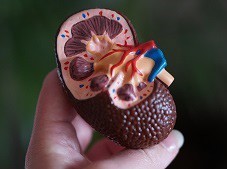Patient Experience
Living with Chronic Kidney Disease
Hilary Rose shares her experience of living with Chronic Kidney Disease, and sheds light on the realities of stigma, diagnosis, and daily challenges for those living with the long-term condition


Could you tell us about how you were diagnosed with CKD?
I was at work one day and I had swollen ankles, I went home and also found that my stomach was swollen. I immediately went to A&E, was admitted to the gastric ward, and believed that something was wrong with my stomach.
One day at a scheduled meeting, I was asked if a student could examine me, and I agreed. One of the students reported back to the consultant, and he said that I was a kidney patient, and not a gastric patient. I was shifted over to the Hammersmith hospital renal team.
Is there a current stigma around CKD, and if so, what is its impact?
I think more in the workplace, you may have to take time off for appointments, and have regular appointments for attending clinics, etc. The impact is depression, worry, and stress, about having to approach your manager.
Do you believe there can be an improvement in how healthcare professionals, and even politicians, approach CKD?
Yes, they need to be more compassionate about our health and lifestyle.
What are the main challenges you face in your daily life?
Coping with my energy levels, and dealing with fatigue and tiredness, can be so exhausting. This is especially true when you want to achieve a goal, and you’ve just got no energy to do so.
Complications for CKD include
High blood pressure
Nerve damage
Anaemia
Poor nutritional health
Weak bones
Increased risk of cardiovascular disease
What are your hopes for the future, in terms of receiving more support for CKD, and enhancing research into your condition?
I got involved with a trial on living with CKD, and it was displayed through cartoon characters. It was interesting because it showed how you can do little exercises to help cope with different issues you may be experiencing as someone living with the condition. For example, it taught us how to deal with negative feelings, by taking a deep breath and expelling it slowly.
I hope this can be recommended for all Kidney patients, not only those on haemodialysis and also for PD. Continue with research and pilot programs, home haemodialysis as a must, and have membership groups where like-minded people can share their experiences.
CKD is a long-term health condition in which the kidneys are damaged and do not function as they should. This impacts the way they filter blood and remove waste products from the body. In the UK, around 3 million people are living with CKD. Currently, over 68,000 are being treated for kidney failure, or stage 5 CKD.
CKD can worsen over time, meaning that eventually the kidneys may stop working altogether, although this is uncommon. If kidney disease worsens, wastes can build to high levels in the blood, and can make those living with the condition feel sick. If kidney disease progresses, it can mean patients require dialysis, or a kidney transplant, in order to live.
Symptoms for CKD include tiredness, trouble sleeping and concentrating, muscle cramping, shortness of breath, blood in urine, and swollen ankles, feet, or hands.
Diabetes and high blood pressure are the most common causes of CKD. However, factors such as high cholesterol, kidney infections, and blockages to the flow of urine such as recurring kidney stones or an enlarged prostate, can also raise risk of the condition.
Different causes of kidney disease may also impact the kind of treatment a patient receives. Early detection of the disease can help prevent progression of CKD into kidney failure.